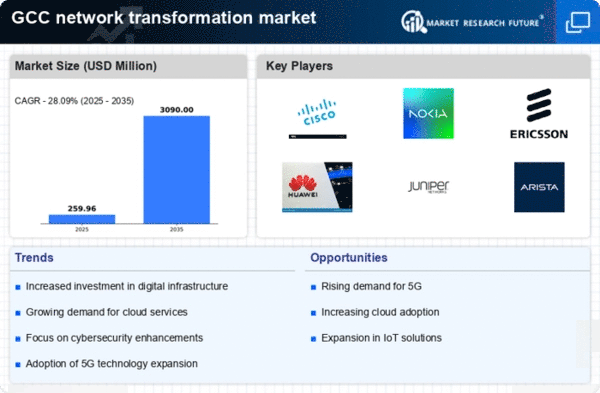Emergence of Edge Computing Solutions
The rise of edge computing is reshaping the network transformation market by enabling data processing closer to the source of generation. This trend is particularly relevant in the GCC, where low-latency applications are becoming essential for industries such as healthcare, manufacturing, and smart cities. By decentralizing data processing, edge computing reduces the burden on central data centers and enhances overall network efficiency. The market for edge computing is projected to grow significantly, with estimates suggesting a potential increase of 40% in adoption rates by 2026. This shift not only optimizes network performance but also aligns with the broader goals of digital transformation in the region.
Increased Focus on Network Resilience
In the current landscape, the emphasis on network resilience is becoming increasingly pronounced within the network transformation market. Organizations in the GCC are recognizing the necessity of building robust networks that can withstand disruptions, whether from cyber threats or natural disasters. This focus on resilience is prompting investments in advanced technologies such as network slicing and redundancy solutions. As a result, the market is witnessing a shift towards more resilient architectures that can ensure continuous service availability. Analysts suggest that this trend could lead to a 30% increase in demand for resilient network solutions over the next few years, further driving the network transformation market.
Government Initiatives and Investments
Government initiatives play a crucial role in shaping the network transformation market within the GCC. Various national strategies aim to enhance digital infrastructure, promote smart city developments, and foster innovation in technology. For instance, the UAE's Vision 2021 and Saudi Arabia's Vision 2030 emphasize the importance of digital transformation, leading to substantial investments in telecommunications and IT sectors. These initiatives are expected to drive the network transformation market, as public and private sectors collaborate to modernize existing networks. The GCC governments are allocating billions of dollars towards these projects, which could potentially result in a more interconnected and technologically advanced region.
Rising Demand for High-Speed Connectivity
The network transformation market is experiencing a surge in demand for high-speed connectivity across the GCC region. As businesses and consumers increasingly rely on digital services, the need for robust and efficient network infrastructures becomes paramount. This demand is driven by the proliferation of IoT devices and the growing trend of remote work, which necessitates reliable and fast internet access. According to recent data, the GCC's internet penetration rate is projected to reach 99% by 2025, further emphasizing the urgency for network upgrades. Consequently, telecommunications providers are investing heavily in fiber-optic networks and 5G technology to meet this demand, thereby propelling the network transformation market forward.
Shift Towards Software-Defined Networking (SDN)
The transition to Software-Defined Networking (SDN) is significantly influencing the network transformation market. SDN allows for more flexible and efficient network management, enabling organizations to respond swiftly to changing demands. This shift is particularly relevant in the GCC, where businesses are increasingly adopting cloud-based solutions and seeking to optimize their network resources. The market for SDN is expected to grow at a CAGR of approximately 25% over the next five years, indicating a strong trend towards this technology. As companies recognize the benefits of SDN, including cost savings and improved performance, the network transformation market is likely to expand in tandem.
















